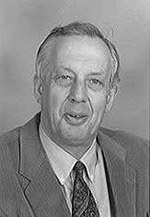
Keith Pavitt
Keith Pavitt, Professor of Science and Technology Policy in SPRU, died unexpectedly of a brain haemorrhage at home in Lewes on 20 December. His funeral took place on 7 January.
In the field of science policy research, Keith was one of the world's leading figures. The field is concerned with such issues as the allocation of resources to science and technology; the nature of the innovation process; how advances in science and technology are translated into economic and social benefits; and the management of research and development (R&D) in the firm.
In all these areas, Keith made fundamental contributions. He was prominent in many of the great debates that have characterised the field over recent decades. He inspired several generations of postgraduate students from round the world. In addition, he was the key figure in establishing Research Policy as the main journal in the field.
While working at the Organisation for Economic Co-operation and Development (OECD) in the early 1960s, Keith started a lifelong collaboration with Chris Freeman, a British economist who was developing some of the first international statistics on research and development.
After a year at Princeton University, Keith moved to Sussex in 1972 and rejoined Chris Freeman who, a few years earlier, had become the first director of SPRU. In 1984, Keith succeeded Chris as the Reginald Phillips Professor of Science and Technology Policy, the post he held until his formal retirement in 2002.
For 30 years Keith was at the forefront of SPRU research, making pioneering contributions in several areas. His principal objective was to analyse and explain differences among firms, industrial sectors and countries in the rate and direction of scientific and technological development. He believed that the starting point for this was to generate better data (or 'indicators') on science, technology and innovation.
Among the numerous SPRU projects that Keith participated in or led were the development of a comprehensive data-bank on British innovations; an influential critique of the 'Limits to Growth' thesis; and incisive analyses of the sources of economic growth, the role of technology in international trade competition, and the management of innovation within the firm. His most recent work focused on the co-evolution of technologies, products and organisation in the business firm.
Keith thrived on debate. He argued with all his colleagues but they invariably came away having enjoyed the argument and feeling that they had learnt something from it. He also loved to challenge conventional wisdom. For example, his passionate insistence on the continuing importance of curiosity-driven science went against conventional wisdom among policy makers that scientific research should primarily support technology and economic growth.
One of his favourite quotations was that without science and technology, "the life of man [would be] solitary, poor, nasty, brutish and short". Here was someone who, through his humanity, enthusiasm, wit and generosity, did all that he could to ensure that we should not suffer this fate.
Professor Chris Freeman, Pari Patel and Professor Ben Martin
|

